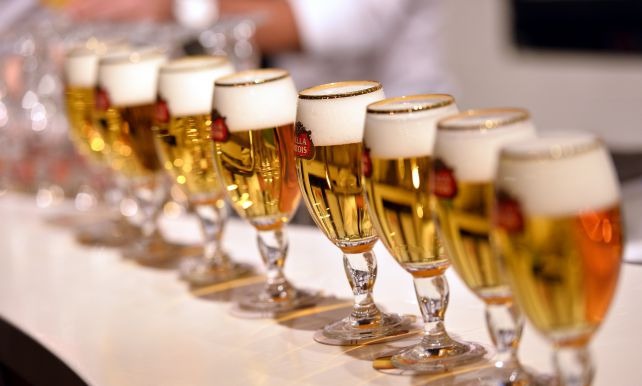The High Council for Health has revised its advice on alcohol consumption, with a number of new recommendations. The Council advises a limit of ten units of alcohol – normal-sized glasses of beer or wine – a week. In addition, restaurants and cafes selling alcohol should provide free water, while customers take care to drink water alternating with alcohol, as well as taking days off when no alcohol whatsoever is drunk.
“Contrary to certain consumer beliefs, all consumption of alcohol, even moderate, has an effect on health,” the Council said in a statement.
The limit is based on a 10cl glass of wine, and a 25cl glass of ordinary draught beer. If another type of beer is preferred, such as a Duvel or a Trappist, then the limit has to be revised downward. The Council has called on brewers to indicate not only alcohol content on their labels, but also the number of standard units of 10g of pure alcohol.
As an indication, the Council published the following measures of what a 10g unit of alcohol translates into at the bar: 25cl of pils, 10cl of wine at 12%, 5cl of aperitif at 25%, and 3.5cl of spirits. A 33cl glass of beer is 1.3 units, while a stronger beer, which mainly comes in measures of 33cl, weighs in at 1.6 to 2.4 units.
The Council’s advice also calls for higher tax and excise duty on alcohol, health warnings on packaging and the provision of free water in all premises serving alcohol. None of the advice, however, is binding.
The new advice, according to brewer and beer expert Jef Van den Steen, is “hugely exaggerated,” he told VRT radio. “My first thought was, 'oh here we go again.' Any time these people come up on the news, it’s always to ban something pleasant. They want to make the point that too much is a bad thing, so they set the limits unreasonably low. This means you can’t even have a whole glass of stronger beer a day.”
Beer consumption by volume has been falling year after year in Belgium, he pointed out. “Belgians are opting less for volume and more for quality. In short, the beer drinker is already on the right path.”
Alan Hope
The Brussels Times

